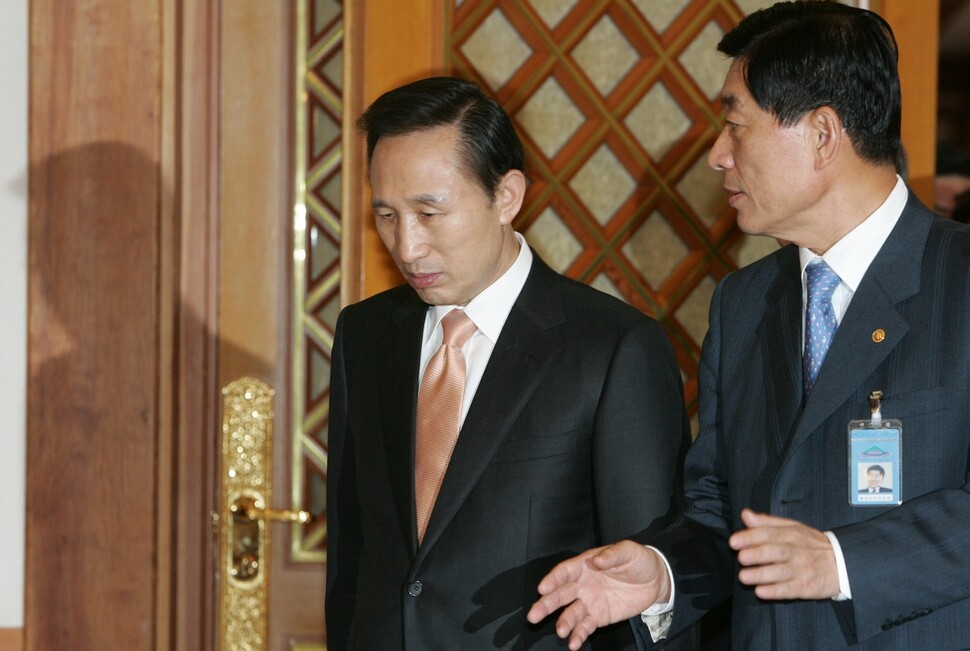hankyoreh
Links to other country sites 다른 나라 사이트 링크
[Editorial] Former NIS director sentenced to four years in prison for election meddling

A South Korean court has convicted Won Sei-hoon, former director of the National Intelligence Service (NIS), with violating both the National Intelligence Service Act and the Public Official Election Act in connection with the 2012 NIS election interference scandal. His case had been reversed and remanded to the 7th criminal division of the Seoul High Court by the Supreme Court, which found on Aug. 30 that Won had “systematically meddled in politics and elections for a long period of time.” Won was sentenced to four years in prison and taken into legal custody.
Now that we have legal confirmation that the NIS systematically interfered in the presidential election on behalf of the candidacy of former president Park Geun-hye, the very legitimacy of that election is cast into doubt. Along with the trial being delayed, the fact that this verdict was only reached after Park had been impeached and detained makes one feel ashamed to say that justice has been served. This reinforces the legal maxim that “justice delayed is justice denied.”
Nevertheless, this verdict offers heavy lessons and tasks which need to be addressed. This case began on Dec. 11, 2012, when lawmakers with the Democratic Party (now called the Minjoo Party of Korea) stumbled upon the apartment of Kim Ha-young, an NIS agent who had been posting political comments online. Over the course of the four years and eight months since then, the naked face of government institutions has been revealed in all its ugliness.
Under Won, the NIS not only gave the Blue House a report it had drafted about “taking over social media” before the general elections and the local elections, but it was also put in charge of “coordinating the candidates of the [ruling Hannara] Party” (a phrase that appears in stenographic records of a meeting of department heads on Nov. 18, 2011) and “vetting candidates” (June 19, 2009). In addition, the NIS took steps to rig the presidential election by organizing 3,500 private citizens into 30 teams charged with manipulating public opinion. These teams posted comments that bashed former presidents Kim Dae-jung and Roh Moo-hyun, saying things like “Kim Dae-jung’s homeland is North Korea” and “in the afterlife, [Roh Moo-hyun] learned that he had committed many terrible sins.” Since torture is no longer an option, the NIS basically came up with a new tactic for gaming the political system – namely, manipulating public opinion.
With the help of Kim Ki-choon, Hwang Kyo-ahn and Cho Yeong-gon, Park’s Blue House attacked public prosecutors who tried to ferret out the truth of the NIS’s intervention in the presidential election, forcing out then-Prosecutor General Chae Dong-wook and reassigning Yun Seok-yeol, who was the chief of the investigating team. Amid all these obstructions, half of these crimes were concealed and distorted. And once the case was handed over to the courts, not even that half of the crimes were punished properly.
After the courts’ baffling equivocation that the National Intelligence Service Act had been violated but the Election Act had not, the Supreme Court found that a key piece of evidence from the trial was not admissible in a suspiciously unanimous ruling. If power had not changed hands and the task force charged with cleaning house at the NIS had not turned up the full transcript of the stenographic records, there’s no telling what the outcome might have been.
Paradoxically, the proceedings of this case serve as an eloquent argument for why it is necessary to break with deep-rooted vices throughout the government, including the NIS, the prosecutors, the police and the courts. Now is the time to determine who was ultimately behind the political meddling committed by the NIS during the Park administration.
Please direct questions or comments to [english@hani.co.kr]

Editorial・opinion
![[Column] Has Korea, too, crossed the Rubicon on China? [Column] Has Korea, too, crossed the Rubicon on China?](https://flexible.img.hani.co.kr/flexible/normal/500/300/imgdb/original/2024/0419/9317135153409185.jpg) [Column] Has Korea, too, crossed the Rubicon on China?
[Column] Has Korea, too, crossed the Rubicon on China?![[Correspondent’s column] In Japan’s alliance with US, echoes of its past alliances with UK [Correspondent’s column] In Japan’s alliance with US, echoes of its past alliances with UK](https://flexible.img.hani.co.kr/flexible/normal/500/300/imgdb/original/2024/0419/2317135166563519.jpg) [Correspondent’s column] In Japan’s alliance with US, echoes of its past alliances with UK
[Correspondent’s column] In Japan’s alliance with US, echoes of its past alliances with UK- [Editorial] Does Yoon think the Korean public is wrong?
- [Editorial] As it bolsters its alliance with US, Japan must be accountable for past
- [Guest essay] Amending the Constitution is Yoon’s key to leaving office in public’s good graces
- [Editorial] 10 years on, lessons of Sewol tragedy must never be forgotten
- [Column] A death blow to Korea’s prosecutor politics
- [Correspondent’s column] The US and the end of Japanese pacifism
- [Guest essay] How Korea turned its trainee doctors into monsters
- [Guest essay] As someone who helped forge Seoul-Moscow ties, their status today troubles me
Most viewed articles
- 1[Column] The clock is ticking for Korea’s first lady
- 2Hong Se-hwa, voice for tolerance whose memoir of exile touched a chord, dies at 76
- 3After 2 months of delayed, denied medical care, Koreans worry worst may be yet to come
- 4[Column] Has Korea, too, crossed the Rubicon on China?
- 5US overtakes China as Korea’s top export market, prompting trade sanction jitters
- 6Samsung barricades office as unionized workers strike for better conditions
- 7[Correspondent’s column] In Japan’s alliance with US, echoes of its past alliances with UK
- 8All eyes on Xiaomi after it pulls off EV that Apple couldn’t
- 9[Correspondent’s column] The US and the end of Japanese pacifism
- 10[Guest essay] How Korea turned its trainee doctors into monsters